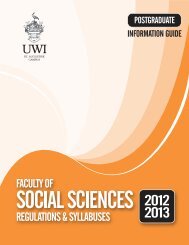Faculty of Humanities and Education (Postgraduate) - The University ...
Faculty of Humanities and Education (Postgraduate) - The University ...
Faculty of Humanities and Education (Postgraduate) - The University ...
You also want an ePaper? Increase the reach of your titles
YUMPU automatically turns print PDFs into web optimized ePapers that Google loves.
POSTGRADUATE REGULATIONS & SYLLABUSES 2012 - 2013<br />
THE FACULTY OF HUMANITIES & EDUCATION<br />
ASSESSMENT<br />
This course shall be assessed through coursework (40%) <strong>and</strong> a<br />
final examination (60%).<br />
REFERENCES<br />
Best, J., & Khan, J. (1998). Research in education. Boston: Allyn &<br />
Bacon.<br />
Borg, W., & Gall, M. (1996). <strong>Education</strong>al research – an introduction.<br />
NY: Longmans.<br />
Cohen, L. (1984). Statistics for social scientists. London: Harper<br />
<strong>and</strong> Row.<br />
Cohen, L., & Manion, L. (2000). Research methods in education.<br />
London: Routledge.<br />
Gorard, S. (2001). Quantitative methods in education research.<br />
London: Continuum.<br />
Keeves, J., & Lakomski, G. (Eds.). (1999). Issues in educational<br />
research. Amsterdam: Pergamon.<br />
Linn, R. (1990). Quantitative methods. NY: Macmillan.<br />
Pring, R. (2000). Philosophy <strong>of</strong> educational research. London:<br />
Continuum.<br />
Wellington, J. (2000). <strong>Education</strong>al research. London: Continuum.<br />
EDRS 6210 - FUNDAMENTALS OF EDUCATIONAL<br />
RESEARCH II (4 CREDITS)<br />
PRE-REQUISITE: FUNDAMENTALS OF EDUCATIONAL<br />
RESEARCH I<br />
OBJECTIVES<br />
Participants will be able to:<br />
(1) describe different approaches to educational research<br />
(2) discuss research issues emanating from different<br />
approaches to educational research<br />
(3) select appropriate research approaches in the investigation<br />
<strong>of</strong> specific phenomena<br />
(4) design educational research in the naturalistic paradigm<br />
(5) analyze qualitative data<br />
(6) develop competence in evaluating the varied forms <strong>of</strong><br />
qualitative research in education<br />
CONTENT<br />
• the quantitative – qualitative dichotomy. Philosophical<br />
underpinnings <strong>of</strong> the empirical-analytic <strong>and</strong> naturalistic<br />
approaches to research<br />
• major research orientations <strong>and</strong> methodologies in the<br />
naturalistic paradigm:<br />
• ethnography<br />
• grounded theory<br />
• case study<br />
• critical inquiry<br />
• the role <strong>of</strong> sociological theory in qualitative<br />
research e.g. hermeneutics, symbolic interaction, <strong>and</strong><br />
phenomenology<br />
• problem identification <strong>and</strong> formulation<br />
• designing research in the naturalistic tradition:<br />
• identifying data sources<br />
• data collection<br />
• data analysis (use <strong>of</strong> computer s<strong>of</strong>tware for<br />
qualitative data analysis)<br />
• ethical issues<br />
ASSESSMENT<br />
This course shall be assessed by coursework (40%) <strong>and</strong> a final<br />
examination (60%).<br />
Required Readings<br />
Belox, M., & Haggerson, N. (Eds.). (1982). Naturalistic research<br />
paradigms. Merrut: Anu Books.<br />
Cresswell, J. (1998). Qualitative inquiry <strong>and</strong> research design:<br />
choosing among five traditions. Thous<strong>and</strong> Oaks, CA: Sage.<br />
Boyatzis, R. (1998). Transforming qualitative information.<br />
Thous<strong>and</strong> Oaks, CA: Sage<br />
C<strong>of</strong>fey, A., & Atkinson, P. (1996). Making sense <strong>of</strong> qualitative data.<br />
Thous<strong>and</strong> Oaks, CA.: Sage.<br />
Kvale, S. (1996). Interviews: an introduction to qualitative<br />
research interviewing. Thous<strong>and</strong> Oaks, CA: Sage<br />
Mann, C., & Stewart, F. (2000). Internet communication <strong>and</strong><br />
qualitative research: a h<strong>and</strong>book for researching on line.<br />
Thous<strong>and</strong> Oaks, CA: Sage.<br />
Swann, J., & Pratt, J. (1999). Improving education – realist<br />
approaches to method <strong>and</strong> research. London: Continuum.<br />
Walford, G. (2001). Doing qualitative educational research.<br />
London: Cassell.<br />
6.1 HEPR 6005 - Pr<strong>of</strong>essional Development Electives <strong>and</strong><br />
Field work (6 credits)<br />
Course Overview<br />
Academic skills benefit from exposure to real world practices.<br />
Moreover, pr<strong>of</strong>essional disciplines benefit from exposure to<br />
the practice <strong>of</strong> other pr<strong>of</strong>essions. This course aims to expose<br />
participants to the problems <strong>of</strong> health promotion in applied<br />
settings, especially as they relate to the application <strong>of</strong> the<br />
strategies <strong>of</strong> the Caribbean Charter for Health Promotion. It<br />
also aims to encourage cross-fertilization <strong>of</strong> ideas by exposing<br />
participants to the everyday activities <strong>of</strong> disciplines other<br />
than their own. <strong>The</strong> practical aspects <strong>of</strong> the course will take<br />
place outside <strong>of</strong> formal teaching blocks <strong>and</strong> most activities<br />
can be undertaken at the participant’s home base, although<br />
a wider perspective will be encouraged. <strong>The</strong> course requires<br />
a compulsory 40-hour attachment to a health promoting<br />
institution.<br />
OBJECTIVES<br />
At the end <strong>of</strong> this course participants will be able to:<br />
• Demonstrate an underst<strong>and</strong>ing <strong>of</strong> the importance <strong>of</strong><br />
widened pr<strong>of</strong>essional experience, <strong>and</strong> exposure to<br />
alternative approaches<br />
• Undertake a critical examination <strong>of</strong> the activities <strong>of</strong> other<br />
disciplines whose work is relevant to health promotion<br />
• Adapt best practices <strong>of</strong> other disciplines to improve<br />
personal <strong>and</strong> pr<strong>of</strong>essional practice where applicable<br />
• Undertake critical reflection on personal practice <strong>and</strong><br />
pr<strong>of</strong>essional growth<br />
113

















